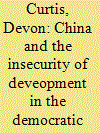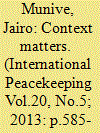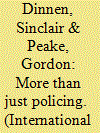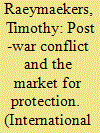| Srl | Item |
| 1 |
ID:
127041


|
|
|
|
|
| Publication |
2013.
|
| Summary/Abstract |
This article analyses China's contemporary engagement in the Democratic Republic of the Congo (DRC) as an example of Chinese involvement in a resource-rich, conflict-affected country. Following a large 'minerals for infrastructure' agreement signed in 2008, China's activities in the DRC are often presented as an example of a departure from Western-led liberal peacebuilding and development, by providing 'corrupt' Congolese national elites with new sources of unchecked rents; or it is viewed as a positive alternative to Western approaches, by focusing on win-win development and reconstruction. Both these views are flawed. Rather than offering a marked alternative to a Western 'liberal' peacebuilding project, this article argues that Chinese interests have increasingly coincided with evolving Western interests in support of stabilization and market-driven economic activities. This, however, does not offer a clear pathway to security and development in the DRC. On the contrary, both Chinese and Western involvement in the DRC provide possibilities for continued insecurity, rather than any fundamental break from previous patterns and structures of politics.
|
|
|
|
|
|
|
|
|
|
|
|
|
|
|
|
| 2 |
ID:
127070


|
|
|
|
|
| Publication |
2013.
|
| Summary/Abstract |
The disarmament, demobilization and reintegration (DDR) programme as implemented in South Sudan provides a perfect entry point to study the interaction between an international intervention and local contexts. The article describes and analyses the DDR programme in South Sudan as a set of practices that are at the core of international peacekeeping and yet are highly challenged by the specificities of local contexts. Consequently, programme results are far from what the international organizations involved expected from the outset, and the case is a vivid example of a lack of context-based approaches to peacebuilding. The article is based on fieldwork conducted among practitioners, project implementers and ex-combatants in South Sudan in 2012.
|
|
|
|
|
|
|
|
|
|
|
|
|
|
|
|
| 3 |
ID:
127067


|
|
|
|
|
| Publication |
2013.
|
| Summary/Abstract |
Against the generally disappointing outcomes of international police reform in fragile settings, this article examines a New Zealand-supported community policing programme in post-conflict Bougainville. While the programme's engagement with the regular police organization has struggled for traction, support provided to an innovative and socially embedded policing initiative has produced promising results. The reasons behind these divergent outcomes and their implications for international policing are explored in the context of Bougainville's recent history, including the legacies of conflict and the new vision of hybrid policing in the post-conflict political settlement.
|
|
|
|
|
|
|
|
|
|
|
|
|
|
|
|
| 4 |
ID:
127078


|
|
|
|
|
| Publication |
2013.
|
| Summary/Abstract |
This article seeks to deepen the debate about violent war-to-peace transitions through a comparative case study between two rebel movements that became integrated in considerably different ways in post-war Democratic Republic of Congo (DRC). The political marketplace brought about by Congo's war-to-peace transition substantially influenced the bargaining power of non-state armed actors in the country's eastern borderlands. In such violent environments, non-state actors like militias, try to become recognized as alternative taxing authorities opposed to state governments, while they simultaneously collaborate with them to gain access to the dividends of international peacebuilding efforts. A decisive factor for the legitimacy of these violent agencies is their ability to transform from coercion- to capital-based organizations: militias, like state governments, need to actively organize local production while embedding their authority in rapidly transforming idioms of political power. This article argues that the 'symbiotic' relationships emerging between rebel rulers, capitalist brokers and state government in the context of protracted armed conflict have far-reaching consequences for the political order of post-war states, with varying results depending on the coercion- and capital-based rule of these emerging complexes in the world's violent peripheries.
|
|
|
|
|
|
|
|
|
|
|
|
|
|
|
|
| 5 |
ID:
127080


|
|
|
|
|
| Publication |
2013.
|
| Summary/Abstract |
International interventions in post-war countries aim to support national governments in rebuilding vital state functions. They de facto become strong political players, but form self-referential systems parallel to national politics, neither checked nor balanced by the population of the respective host country. This relationship is explored in the case of Liberia, where we analyse different forms of resistance and their resonance for the international intervention. Our findings indicate that intervening actors in Liberia largely fail to respond to constructive forms of resistance. However, destructive forms of resistance such as violence and obstruction provoke strong attention. This creates an environment that is not conducive to an inclusive and stable democracy.
|
|
|
|
|
|
|
|
|
|
|
|
|
|
|
|